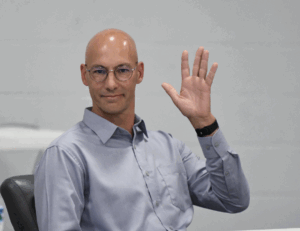
Loving thy neighbor
An Eastern Wayne High School graduate bumps into a former classmate.
It’s been years since they shared a classroom and when their eyes meet, it’s clear they have taken drastically different paths.
One is a respected minister — a leader, not just in Goldsboro, but beyond the borders of the county it calls home.
The other has fallen into a lifestyle that “even he knows” is less than morally sound.
But Pastor Terry Jones doesn’t judge the man who looks back at him with a sense of shame.
He responds with unconditional love. For Jones, every soul is redeemable — and worth saving.
“I see who you are, but I know who I met. And I know the potential that’s inside of you. So, as long as you’re breathing, I’m not giving up on you,” Jones said. “I don’t know what your family thinks. I don’t care what the community thinks. I know what I see, but I know who I met. I know what’s in you. So, every time you see me, I’m going to be pushing you to become who I know you can be.”
•
A young couple with standing in Jones’ congregation experiences a “moral failure” — one that, in the past, might have warranted them being asked to remove themselves from City Church.
But when they come to meet him — and his wife, Juliet — something unexpected happens.
“There was a moral failure that was a black eye to their family, and in many cases, it was a black eye to the ministry because of the role that they were in. In times past, I had seen where these types of moral failures required disconnection. Like, you’ve got to step away. This is embarrassing,” Jones said. “But I remember having that first conversation … and we cried and we wept. There was a lot of pain.”
And out of the pain came a solution.
“My words were, ‘This is what a restoration plan looks like. This is where you are. This is what’s happened. But if you walk with me through this plan, everything is gonna be just fine,’” Jones said. “Today, this family is a model in the community. They remain leaders in our ministry. That is an example of what this culture needs.”
Juliet smiles, nodding her head in agreement.
“People don’t want to be dropped,” she said. “Just the fact that we were able to walk alongside them … is what I think ultimately saved them.”
•
A mother gets word to Jones that her son is having trouble at school.
He understands that the “responsibility of ministry forever” is to serve the “present age.”
He knows that children in his community are living in an era of fatherless homes and poverty.
“So, we have become all things that we might win some … and this present age might need a bit more fathering. I say, ‘Send me the address. Send me the teacher’s name. I’ll be there in 30 minutes,’” Jones said. “There’s something about walking into that school. I don’t even have to say nothing half the time. If I just stick my head in, they see that guy they see on Sunday. They’re like, ‘That’s my guy. He took the time out to show his face when I was kind of having a rough day.’ Often times, that’s all it takes.”
In those moments, he finds it incredible what can be accomplished in a two- minute conversation.
“We are family, so when there’s that child who is without parents, we take on that responsibility of spiritual parents. And it’s not just us, it’s our entire church community,” he said. “For that widow without husband and/or child or the children are living somewhere else, we become your de facto children. That is the community component that is missing in so many areas that we try to provide.”
Juliet says it’s a sight to behold.
“It’s the power of presence,” she said. “It’s everything.”
For the Joneses, City Church is more than a place you go on Sunday.
The sermon is about far more than sharing — and analyzing — passages from the Bible.
For them, the ministry is a daily walk alongside those young and old members of their congregation who seek salvation.
“For us, it’s about more than salvation — getting you to Heaven. It’s about until you get there, how can we help you manage your money? How can we help you and your family structure? Until you’re called home, how can we help to make your marriage one that you actually enjoy versus one that you resent going home to every day?” Jones said. “So, from a holistic perspective, we become a part of every day of your week because we tap into every element that’s a part of that week. It’s one thing to read the Word. It’s another thing to know it. But how can we use it? When I leave Sunday, how can I use this on Monday? How can this be applied to my life through the course of my week?”
Juliet would tell you the answer is simple, particularly for the youngest members of City Church — the children and teenagers who seem, at times, to be taking the wrong path.
“For me, the center of it all is love. At the end of the day, these kids want to feel loved and they want to feel heard. We try to do a good job of providing that space. We want to hear where you’re coming from,” she said. “That’s why it can reach a 5-year-old. It can reach a 7-year-old. It can reach an 11-year-old. It can reach a 16-year-old. The love draws them in.”
And it is the love they exude — a pure love that asks for nothing in return — that has made them beloved, both within their congregation and far beyond its walls.

A loaded discussion

Fighting for their lives

Goldsboro loses a giant

“I’m a flippin’ hurricane!”
Public Notices — Dec. 14, 2025

Belting it out

Legendary

Final Four!


